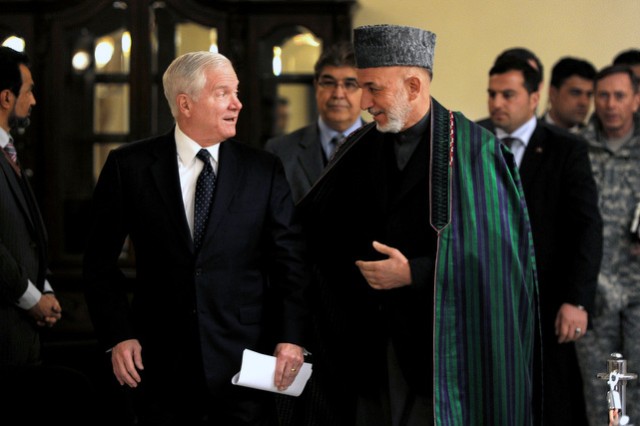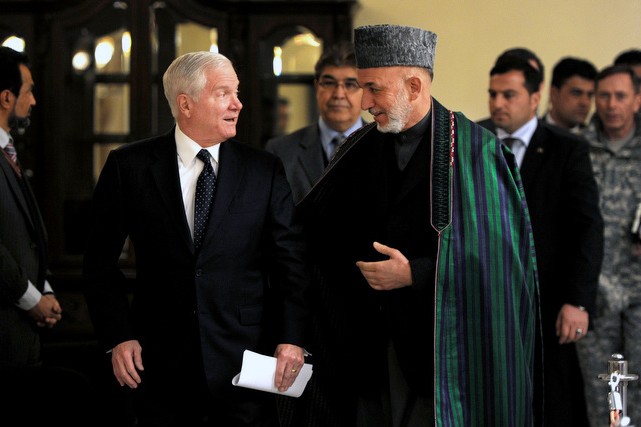KABUL, Afghanistan, March 7, 2011 -- Civilian casualties and the impending drawdown of U.S. forces in Afghanistan highlighted a discussion here, today, between Defense Secretary Robert M. Gates and Afghan President Hamid Karzai.
Gates and Karzai met at the presidential palace and then participated in a joint news conference.
Welcoming Gates for his 13th visit to Afghanistan as defense secretary, Karzai said the secretary is a "highly respected" U.S. Cabinet member, a great friend of Afghanistan, and an important element of the two nations' growing partnership.
The president said he and the secretary discussed many issues: training Afghan security forces, the strategic partnership between the two countries, and the start of transitioning security responsibility in his country to his country's forces.
"Of course, civilian casualties was one of the issues we discussed," Karzai said.
NATO helicopter crews killed nine Afghan boys in a March 1 incident. The NATO-led International Security Assistance Force issued a statement March 2 accepting responsibility and apologizing for the deaths.
"The incident occurred following insurgent rocket attacks on [Forward Operating Base] Blessing," the statement said. "Coalition forces returned fire at the assessed point of origin with indirect and aerial fire. Regrettably, there appears to have been an error in the hand-off between identifying the location of the insurgents and the attack helicopters that carried out subsequent operations."
The statement included a personal apology from Gen. David H. Petraeus, ISAF commander.
Gates today said he, too, apologized for the deaths.
"This breaks our heart," the secretary said, terming the deaths not only a tragic loss to their families, but also a setback to U.S.-Afghan relations.
"We have been working extremely hard to avoid civilian casualties," Gates said, adding that even including the boys' deaths, coalition forces have reduced civilian deaths over the last couple of years.
Gates said he personally apologized to Karzai.
"I know these tragedies weigh heavily on his heart and create problems for him as the leader and protector of the Afghan people," he added.
The two nations must continue working to strengthen the "significant security gains" that make Afghanistan increasingly safer for all of its citizens, Gates said.
"Tonight President Karzai and I had a very productive discussion about how to maintain this momentum, as we look forward to beginning the formal transition to Afghan security lead this summer," he said.
Gates said when he last visited Afghanistan in December, he found coalition and Afghan forces' gains against insurgents had exceeded his expectations, and from what he's seen so far on this trip, that progress continues.
"They have not let up pressure on the enemy at all this winter," he said. "In fact, we are conducting a record number of operations."
The secretary said those ISAF-Afghan operations are expanding security zones in the east around Kabul and Jalalabad, freeing population centers and commerce routes from insurgent disruption.
"As a result, commerce has grown and distant provinces are increasingly connected to major marketplaces," Gates said, noting similar results can be seen in Afghanistan's south.
"A semblance of normalcy is now beginning to return to local populations, now free of [Taliban] threat," he said.
Ultimately, coalition and Afghan forces aim to link security zones around Helmand and Kandahar in the south and Kabul in the east, the secretary said.
"Because of the shared sacrifices of Afghan and coalition forces," he said, "we are now closer than ever to President Karzai's goal of building Afghan National Security Forces that can take the lead in their nation's security."
As Karzai's government plans for that transition, Gates said, the coalition is examining how best to redistribute forces when the security transfer process begins.
"In my view, we will be well-positioned to begin drawing down some U.S. and coalition forces this July, even if we redeploy others to different areas of the country," he said.
"We are not leaving Afghanistan this summer," the secretary stressed. "Come September, October and beyond, there will still be substantial numbers of coalition forces here, still partnering with Afghans and still maintaining unrelenting pressure on our enemy."


Social Sharing